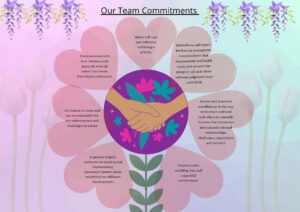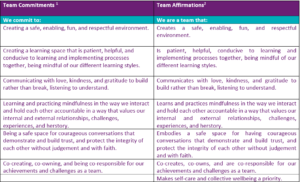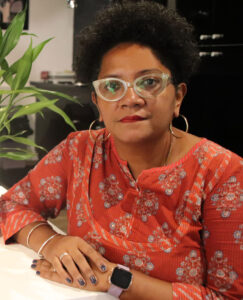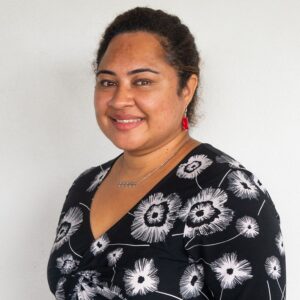Team Culture Part 1: Building an Empathetic and Nurturing Organisation
June 3, 2022

By Michelle Reddy and Tiriseyani Naulivou
Dear Readers,
How well do you work with others? Do you want to learn how to improve your ways of working?
Welcome to the first of a reflective series of blogs written by different members of the Women’s Fund Fiji (the Fund) on these topics.
Over the next few months, we will be sharing our journey of looking within our team and the way we work with each other. We will explore why it is important to invest time, energy, and other resources towards intentionally building a work culture that is empathetic and nurturing.
For us at the Fund, it all started with a conflict we had within the team. Although the conflict did not involve every one of us, over time, we realised that it was affecting us all. The conflict really stemmed from the way that we communicated with each other, the way that we made assumptions about each other, and the way in which we brought ourselves, our full selves to our workspace.
Conflicts are not great, and people react to conflicts differently. Some put up walls and refuse to address the conflict whilst some tend to be bystanders. Then there are others who feel that conflicts are not necessarily a bad thing; rather, they show you that there is tension, either at the shared or individual level. Most importantly, conflicts give you an opportunity to learn, to unlearn, and to create something new. Conflicts create change. And change, our dear reader, is inevitable- there will always be change. How we approach change tells us a lot about ourselves.
In a small team of eight, where each role is linked to another, and where our combined strengths and challenges are our greatest treasure, it was prudent for us to address the conflict. We began – actually the leadership team made up of Michelle Reddy and Menka Goundan, hosted individual meetings with each of the team members – seeking professional help in the form of a counsellor and behavioural specialist to unearth the strands that led to the conflict but most importantly, to strengthen the strands that could rebuild a reflective, trusting, and transformative dynamic within a team.
Our first set of in-depth work with Asinate Korocowiri and Dr. Marilyn Cornelius were the development of individual and team commitments that would guide our communication practices. These individual and team commitments were used as a map for us to explore how we were interacting with each other. Over a year, we reframed the commitments to action-oriented affirmations. We began to embody the practices as habits.

At a deeper level, we came to acknowledge that inner work brings healing, and that healing showcases itself in the way we interact with others, whether it be our work colleague, our family, our partner, our friend, our grantee partner, our funder, or ally. We learned that our individual past experiences and trauma can affect our communication styles and interactions. What began as a single session turned into monthly team sessions where we stopped work – well work in the conventional sense – and instead spent the day leaning into ourselves and into our team. Some of our colleagues learnt from these sessions that there were trauma, deep trauma that were limiting and damaging for them, so they took up counselling sessions, and individual and group life coaching sessions.
We began to create a space, a relationship with each other that was safe. This relationship made it safe for us to trust each other, communicate from our authentic self, safe to make mistakes, and to frame those mistakes into learning, exploring self and collective care from a place of self-awareness and self-compassion.
Inner work is not easy, and we usually do not pay attention to it in the workplace. The assumption is that you bring your best self to any workspace and that is great because a lot of people aspire and bring their best selves. But we each have our own traumas that can bring out the worst in us, and we can bring that to the workspace too. It takes a courageous team member to name the behaviours and practices that are detrimental, and it takes a supportive team to explore these together to change the team dynamics and organisational culture to one that is reflective of organisational values. It takes political will and authentic leadership to pave the way for a truly empathetic and nurturing organisation.
As an organisation, since our inception, we have described ourselves using the words – empathetic, adaptive, feminist, and influence.[3] We are holding ourselves accountable to these by ensuring that our team, the heartbeat of the Fund, embody these values and ways of being. At the macro level of the work we do, we want to see women and girls across Fiji thriving and living their best lives because they are empowered to do so, and because they are in an environment that is supportive. At the micro level, we want to see that for our team. We continue to strive to create that same supportive environment for all our team members. Our eyes continue to be opened to the truth that in order to effectively do the work we are called to do, we must first become the change we want to see.
What happens when an organisation is empathetic and nurturing – how does it affect productivity? We explore this in the next blog in our series.
About the Authors
 Michelle Reddy is a queer feminist who has been part of the women’s movement in Fiji and the Pacific. Michelle led the establishment of the first national women’s fund in Fiji and the Pacific called the Women’s Fund Fiji from 2017 to March 2022. As a Consultant Co-Lead, Michelle is currently working towards the establishment of the Pacific Feminist Fund, which will be the first regional women’s fund in the Pacific.
Michelle Reddy is a queer feminist who has been part of the women’s movement in Fiji and the Pacific. Michelle led the establishment of the first national women’s fund in Fiji and the Pacific called the Women’s Fund Fiji from 2017 to March 2022. As a Consultant Co-Lead, Michelle is currently working towards the establishment of the Pacific Feminist Fund, which will be the first regional women’s fund in the Pacific.
Michelle serves as an advisory member on the Equality Fund’s Catalyse Program, Human Rights Funders Network’s Global Racial Justice Council, and United Nations Pacific Insurance and Climate Adaptation Programme under the UN Capital Development Fund. Michelle is currently a Co-Coordinator for Prospera Asia and Pacific Chapter of Women’s Funds.
A lover of sarees and snail mail Michelle is based in Suva, Fiji Islands.
 Tiriseyani Naulivou has over ten years of community development experience, having served in various roles at Partners in Community Development Fiji (PCDF) and as Monitoring, Evaluation and Learning (MEL) Officer with the Australian Government’s Fiji Program Support Facility. In her community development work she has fostered organisational culture of appreciating MEL as a key component of work, and also contributed to ensuring that gender is a cross-cutting priority within the programs she has worked with. Tiriseyani is passionate about community development as well as mental health and suicide prevention. She facilitated the formation of the Youth Champs for Mental Health in 2008, and currently serves on the Board of PCDF.
Tiriseyani Naulivou has over ten years of community development experience, having served in various roles at Partners in Community Development Fiji (PCDF) and as Monitoring, Evaluation and Learning (MEL) Officer with the Australian Government’s Fiji Program Support Facility. In her community development work she has fostered organisational culture of appreciating MEL as a key component of work, and also contributed to ensuring that gender is a cross-cutting priority within the programs she has worked with. Tiriseyani is passionate about community development as well as mental health and suicide prevention. She facilitated the formation of the Youth Champs for Mental Health in 2008, and currently serves on the Board of PCDF.
[1] Developed in November 2021
[2] Reviewed and refined in March 2022
[3] https://womensfundfiji.org/about-us/
One response to “Team Culture Part 1: Building an Empathetic and Nurturing Organisation”
Leave a Reply
Recent Whats New
From Restless Nights to Renewed Hope
January 23 2026
Taveuni Women’s Empowerment Support Group Pushes Boundaries
January 14 2026
Levukana Women Redefine Farming and Gender Roles in L
November 26 2025
Resilience and Sustainability in Action
October 28 2025

I’m really happy that your team is prioritizing this.